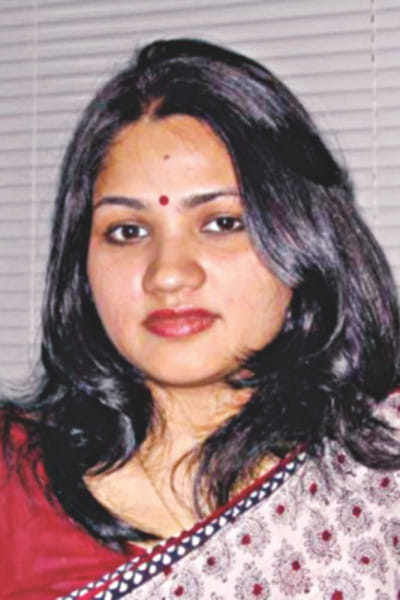Michael Madhushudan Dutta Award for Sharmini Abbasi

When you are born to a family of luminaries, it is difficult to exude your own light out of the shadows of the giants who have been your predecessors. Sharmini Abbasi is one of those figures who has toiled hard to be her own successful person, in spite of the heavy load of cultural and literary inheritance that she carries and which often poses as a burden. Sharmini's balance has been steady. She has stood first class first in Honours & Masters in Law from Dhaka University and earned another Masters in Law from School of Law, University of Georgia, USA. She joined multinational organisations and rose to be the head of legal services at BRAC Bank, Grameenphone, Robi, and then shifted to private consultancy in law.
This is because, in between her corporate career, she has been a successful writer. Her first book was titled Amar Meyeke Boli (2003), which is essentially what a mother feels about the values captured during her times and those that are now in vogue in the materialistic, corporate culture of elitist neighbourhoods of a developing nation. It has received immense appreciation by critics ranking amongst the first ten books by Prothom Alo of Ekushey Book Fair of 2003. Whereas, her childhood was spent making dolls with shredded clothes from the tailor, her daughter (meaning the next generation) is too conscious of Pocahontas/Barbie and all the latest names which only affluent people can buy and hence their friendship with only one segment of the society develops their persona as a one-eyed sailor from Treasure Island, the other eye is completely closed as it has not seen the beauty from the simple pleasures of plying paper boats on a rainy afternoon. Perhaps it is a part of the transition that a developing country faces when it goes from 80 percent employment in the agricultural sector to a more non agrarian job-oriented middle income country. For her son Alvi, she wrote another book titled Amriter Putro. Other books include Poitrisher Jeebon, Babar Desher Kurua, Neelpodder Khoje and Ami Shunini Tomar Dak. My favourite is her novel through letters, two people, earlier in love, find each other through the digital media and cruise through their memories and wonder why their union did not occur. Each has his/her own interpretation of why they parted in Adritar Chithi (Mowla Brothers, 2004). This book has been enlisted as among the 100 bestsellers in Bangladesh.
This year, she is receiving the prestigious award in literature: Michael Madhushudan Dutta Award, from Kolkata. This is indeed a feather in her cap as her name will be listed with literary giants such as Sunil Gongopadhay, Narayan Sannyal , artists like Hemanta Kumar , Shyamal Mitra and many others. The book for which she is being awarded is titled Babar Desherkurua, an excerpt from a song written by Abdul Karim (the younger brother of Abbasuddin Ahmed). The book is on the reflections of a middle aged woman who leaves her cushioned and privileged natal home to become a wife, mother, societal lady, join the corporate job ladder and yet the spouse does not take up the roles that needs to support such kind of a multi-tasker. She is constantly reminded of the Kurua bird, in the same tune as a young rural girl offers the empty heart to the Padma River and asks it to take it back to her old home (Poddar Dheu Re), the age old longing and tears of a woman for her parental home and days gone by. The theme is not new, but the book is. The analogies are unique, the parallels are solely hers, and just as an old song sung by a new artist offers a sudden twist which makes you love the new rendition the book finds its novelty in the writing style. Not to mention that her thoughts are progressive, and deals with issues of mental health and inequality of women's roles in raising children. Sharmini's knowledge of Jeebonando, Tagore, Nazrul, Islamic and folk songs from her childhood keeps recurring like a breath of fresh air. It seems that she is craving to open the windows of her mind "khola hawa lagiye pale, tukro kore kachi, ami dubte raji achi" that is in Tagore's words go with the wind and rediscover oneself again and again, which is so missing in society. We are only thinking from the boxes and our thoughts are never aired, not even during the lovely winter sun, it airs our clothes but not our mentality. Being accorded an honour for airing true feelings is genuinely laudable. May this be the beginning and through the pen of Sharmini let all doors be wide open for the future generations to enjoy the beauty inherent in literature!
Nashid Kamal is an Academic, Nazrul exponent and translator.

 For all latest news, follow The Daily Star's Google News channel.
For all latest news, follow The Daily Star's Google News channel. 


Comments